|
|
|
Sort Order |
|
|
|
Items / Page
|
|
|
|
|
|
|
| Srl | Item |
| 1 |
ID:
191865


|
|
|
|
|
| Summary/Abstract |
This article focuses on the propaganda campaign that advisors to ʿAbd al-ʿAzīz Āl Saʿūd (“Ibn Saud”) –– emir, later sultan, of Najd and, later again, king of Najd and Hijaz, and finally king of Saudi Arabia –– engaged in between 1918 and 1932. It argues that this prolonged campaign was as crucial to the establishment of the state as the sultan’s military conquest of the land. I term this a “campaign” because it was a connected attempt, having constant, clear messages emphasising ʿAbd al-ʿAzīz’s positive leadership qualities, his reformist, modernising intent, and a positive representation of Wahhabism. It also disparaged his enemies and emphasised the natural unity of his recently conquered land. The campaign was central to persuading regional and global powers of the viability of ʿAbd al-ʿAzīz’s state-making project, and later, to gaining official diplomatic recognition of the Saudi state. The article studies this unfolding campaign through analysis of autobiographies, memoirs, travel and history books and articles written by ʿAbd al-ʿAzīz’s advisors; critical engagement with recent ample information on these advisors found on Saudi websites and in Saudi history books and the press; and US diplomatic correspondence.
|
|
|
|
|
|
|
|
|
|
|
|
|
|
|
|
| 2 |
ID:
119621
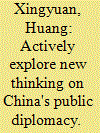

|
|
|
| 3 |
ID:
157389
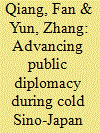

|
|
|
|
|
| Summary/Abstract |
Tense political relations are seen as a barrier to China's public diplomacy with Japan. despite various setbacks, Confucius Institute, a classic example of public diplomacy, have continued to stay open in Japan. This paper uses the Confucius Institute at Ritsumeikan (CIR) as a case study to explore how public diplomacy can be carried out when political relations between China and Japan are cold. It concludes that cold political relations do not necessarily mean public diplomacy will fail. Good cooperation with Japanese partners can bring positive results.Also, choosing the right partner is important; government interference should be avoided. Finally, China should deal with each Confucius Institute differently, and Japanese universities enthusiasm should be stimulated through encouragement and retreat mechanisms.
|
|
|
|
|
|
|
|
|
|
|
|
|
|
|
|
| 4 |
ID:
176927
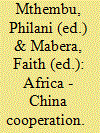

|
|
|
|
|
| Publication |
Switzerland, Palgrave Macmillan, 2021.
|
| Description |
xi, 240p.hbk
|
| Standard Number |
9783030530396
|
|
|
|
|
|
|
|
|
|
|
|
Copies: C:1/I:0,R:0,Q:0
Circulation
| Accession# | Call# | Current Location | Status | Policy | Location |
| 059979 | 337.6051/MTH 059979 | Main | On Shelf | General | |
|
|
|
|
| 5 |
ID:
095949


|
|
|
| 6 |
ID:
155351
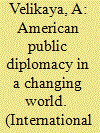

|
|
|
|
|
| Summary/Abstract |
TODAY, many countries rely on public diplomacy (PD) when dealing with expert communities and civil society in other countries: foreign policy is growing increasingly personalized all over the world making PD dealing with specific circles of foreign audiences a useful and very much needed instrument.
|
|
|
|
|
|
|
|
|
|
|
|
|
|
|
|
| 7 |
ID:
162510
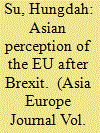

|
|
|
|
|
| Summary/Abstract |
The Brexit was in general interpreted as damage to the EU image abroad. In order to understand this damage and to propose some remedies for the EU public diplomacy in Asia, the authors conducted a media analysis of mainstream newspapers between May and October 2016 and a general survey between July 2016 and February 2017 in Taiwan. Based upon this analysis and survey, the authors intended to give a picture of EU image in Taiwanese media and people’s perception after the Brexit and find out key factors shaping this image. According to them, EU was frequently reported as a reference rather than a focus in Asian media, of which a majority of reports were neither positive nor negative. Brexit did increase visibility of the EU but in a very negative way. In order to remedy this damage and promote EU image in the aftermath of Brexit, the authors proposed two approaches after an in-depth study of all of those news reports and the general survey. It is suggested that EU should continue to strengthen its bilateral relationship with Asian countries and, at the same time, adopt normative actions on the world stage.
|
|
|
|
|
|
|
|
|
|
|
|
|
|
|
|
| 8 |
ID:
143522
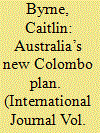

|
|
|
|
|
| Summary/Abstract |
The New Colombo Plan (NCP), a key plank in the Australian government’s foreign policy agenda, leverages student mobility as public diplomacy to improve Australia’s standing and influence within the Indo-Pacific region. Conceptualized as a “rite of passage” for young Australians, the NCP has been welcomed by Australian business, industry groups, and stakeholders because of its potential to deliver lasting relationships and practical economic benefits. Coordinated by the foreign affairs portfolio, the NCP represents a significant and distinct component of Australia’s public diplomacy, firmly aligned to advance the state’s economic diplomacy agenda. This paper explores the evolution of the NCP. It draws on stakeholder impressions from the program launch and pilot to explore early limitations and deeper soft power challenges. Findings suggest that the NCP is robust, yet key issues of strategic coherence, partnership, and evaluation require further attention if it is to deliver on its soft power promise.
|
|
|
|
|
|
|
|
|
|
|
|
|
|
|
|
| 9 |
ID:
165207
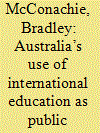

|
|
|
|
|
| Summary/Abstract |
This research utilises expert interviews to investigate why the Australian Government funds the New Colombo Plan (NCP) and the Australian Studies Centres (ASCs) as public diplomacy in China. The ASCs have grown with no increase in funding, however, the academics view themselves as facilitators of Australian Studies not an arm of public diplomacy, despite their work contributing toward positive Australia-China relations. Evaluating the efficacy of the ASC’s contribution to public diplomacy is fraught with risk. Some suggest that political activism may backfire when governments explicitly outline their soft power strategies. As the NCP has no longitudinal measurements, this research is an initial review of short-term achievements. However, the external survey with 16% return rate, and just over 50% response rate indicating an intention to act as ambassadors for the program, requires review by the funding department. The opportunity for the Government to send a positive message to China and the strong people-to-people networks fostered by the two programs’ participants have the potential to influence the nexus between Australian foreign policy, international education as public diplomacy and public engagement with foreign policy. This alone, should be sufficient to justify continued funding, or in the case of the ASCs, increased funding.
|
|
|
|
|
|
|
|
|
|
|
|
|
|
|
|
| 10 |
ID:
186919
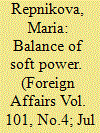

|
|
|
| 11 |
ID:
164641


|
|
|
|
|
| Summary/Abstract |
Public diplomacy (PD) lacks an agreed-upon definition and boundaries. The ambiguity surrounding the conceptualization of the term leads to confusion among scholars and practitioners and hinders the consolidation of PD as an academic field. This article surveys 160 articles and books on PD, categorizes diverse perspectives into a taxonomy, and explores the coherence of each. The taxonomy can be categorized into these perspectives: state-centric, neo-statist, nontraditional, society-centric, and accommodative. The article maps the boundaries of public diplomacy with much needed clear and coherent criteria and positions PD within the broader discipline of international relations.
|
|
|
|
|
|
|
|
|
|
|
|
|
|
|
|
| 12 |
ID:
151697
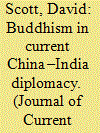

|
|
|
|
|
| Summary/Abstract |
Buddhism is being emphasised strongly in both Chinese and Indian public diplomacy, as they both seek to increase their soft-power attractiveness. This article finds that while Buddhism has served to draw the two countries together in their bilateral relationship, their current invocation of Buddhism as a bridge is in many ways an ahistorical reconstruction. The article also finds that Buddhism operates as a tool of diplomacy in a competitive way, as China and India both seek influence among Buddhist countries elsewhere in Asia and among international Buddhist organisations. Finally, this article finds that whereas China’s use of Buddhism is straightforwardly tactical and to a degree disingenuous, India is able to incorporate genuine spiritual elements into its use of Buddhism, albeit within a setting of Hindu reinterpretation of Buddhism. In the future, China could shift from a short-term tactical to a long-term normative use of Buddhism within international socialisation scenarios.
|
|
|
|
|
|
|
|
|
|
|
|
|
|
|
|
| 13 |
ID:
132436
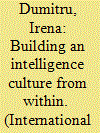

|
|
|
|
|
| Publication |
2014.
|
| Summary/Abstract |
Collective perceptions on intelligence services have been for centuries associated with a sense of mystery, obscurity, and clandestine behavior. At the same time, intelligence success could not be traditionally conceived and exercised in the absence of cover, duplicity, truth manipulation, and intentional avoidance, as well as of masks adapted to context. Therefore, intelligence would traditionally be based on secrecy and a mainly "no communication" approach. Thus, secrecy inherently marked intelligence, as both a barrier created from inside the organization towards the outside world and as a label placed by public opinion on the intelligence organization, therefore shaping knowledge of what cannot otherwise be known.
|
|
|
|
|
|
|
|
|
|
|
|
|
|
|
|
| 14 |
ID:
126399


|
|
|
| 15 |
ID:
189788


|
|
|
|
|
| Summary/Abstract |
TODAY, amid accelerated globalization and the informatization of society, one of the most urgent tasks for states is to form a positive obraz [image, figure, representation - Trans.] and increase competitiveness in the international arena. Like any other country, Russia strives for recognition in the world. However, the approaches to the development of our country's foreign policy image have varied significantly at various stages of the country's development. In this regard, study of the peculiarities of the evolution of the concept of a country's imidzh [a Western borrowing that has a more restricted usage in the fields of politics and public relations - Trans.], its content, and methods of formation, is of particular interest.
|
|
|
|
|
|
|
|
|
|
|
|
|
|
|
|
| 16 |
ID:
148502
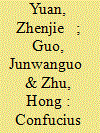

|
|
|
|
|
| Summary/Abstract |
The majority of Anglophone literature tends to portray Confucius Institutes as playing a successful role serving China’s interests in its foreign collaborations. So far, the threat of this institution has been largely stereotyped and even taken for granted. Few scholars question the influence and capacity of the institution on both global and local scales. Relying on cartograms, correlation and national image analyses as well as qualitative studies, this article examines the influence of Confucius Institutes as the institution globalized and localized. This article reports three main findings: (1) the geopolitical influence of Confucius Institutes is uneven in different regions and they are engaged in an ongoing process of geopolitical construction; (2) analyses of correlation with China’s national image show that not only does the influence of the institution vary in regions but also that the project could have a negative impact on bilateral cooperation, suggesting that, contrary to popular thinking, Confucius Institutes have not had a positive impact on China’s global interests; and (3) the capacity of the institutes in everyday operations is systematically limited, reflecting China’s inexperience in managing this global cultural network. Confucius Institutes are generous in making economic concessions but are hesitant during political negotiations, which can be said to mirror China’s patchy performance in economic and political reform.
|
|
|
|
|
|
|
|
|
|
|
|
|
|
|
|
| 17 |
ID:
129560
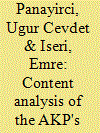

|
|
|
|
|
| Publication |
2014.
|
| Summary/Abstract |
This article examines political leaders' framing strategies during times of public diplomacy crisis. By focusing on the nexus of domestic-international politics, it argues that during public diplomacy crises, policy-makers would like to utilize their speech acts on foreign policy issues to manage expectations of domestic public opinion. This paper's main contention is to demonstrate that the head of AKP (Adalet ve Kalk?nma Partisi) government, Recep Tayyip Erdo?an, has instrumentalized his foreign policy speeches with the label of "honorable" to legitimize AKP's practices at the domestic level.
|
|
|
|
|
|
|
|
|
|
|
|
|
|
|
|
| 18 |
ID:
102182


|
|
|
| 19 |
ID:
167545
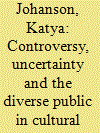

|
|
|
|
|
| Summary/Abstract |
In the past few years, foreign policy tensions between China and Australia have become especially fraught. In some cases, this political situation manifests in the very diplomatic initiatives that were funded to help ease relations. This article considers a case study of a theatrical collaboration in the context of contemporary Australia–China relations to interrogate the value of our understandings of and evaluation frameworks for public diplomacy. This article argues that theories of cultural diplomacy and assessments of initiatives need to consider the multiple and competing objectives, diverse publics and controversial receptions that may be the outcomes of cultural diplomatic initiatives. It demonstrates this complexity in relation to Australia–China relations. Taking a cultural diplomatic initiative that sought to increase positive association for Chinese culture in the Australian public as a case study, it illustrates the range of differences that can be found amongst stakeholders, and the different roles that may be ascribed to cultural diplomacy. These interests, including those of different artistic and political stakeholders, as well as differences in the publics involved, are best segmented not only according to nation but also to subculture.
|
|
|
|
|
|
|
|
|
|
|
|
|
|
|
|
| 20 |
ID:
129670
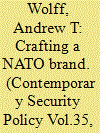

|
|
|
|
|
| Publication |
2014.
|
| Summary/Abstract |
NATO confronts four distinct public perception challenges: weak or varying public support for the alliance and its specific missions; a general lack of public awareness of the alliance's post-cold war transformation; diverging opinions on its proper role in the world; and parochial and domestic interests filtering into NATO's agenda. These various public relations challenges detract from alliance cohesiveness, impede mission performance, breed confusion and dissension about alliance aims, and raise questions about the proper operation of democratic governance within the alliance. Recent alliance communication efforts encompassing public diplomacy and strategic communications have failed to improve these public perception challenges. Instead, NATO should consider adopting a long-term branding strategy that focuses specifically on shaping the public's mental image of the alliance through the creation, promulgation, and management of a core message. Such a strategy has the potential to create a more consolidated alliance mandate that is easier for the public to understand and, ultimately, transforms the way NATO relates to its public.
|
|
|
|
|
|
|
|
|
|
|
|
|
|
|
|
|
|
|
|
|